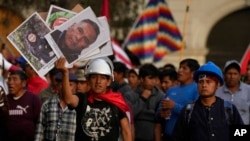Peru's Congress on Wednesday rejected a proposal to move elections forward to December 2023, despite nearly two months of protests that have left dozens dead following the ousting of former President Pedro Castillo.
Lawmakers will continue debating a different proposal to hold early elections, a key demand of the protesters. But Peru's Congress is deeply fragmented and reaching an agreement is tricky.
The first proposal, which came from the right-wing Popular Force party, was rejected by 68 lawmakers, and voted in favor of by 54, with two abstentions.
Jorge Montoya, a congressman and spokesperson for the far right-wing Popular Renovation party, said during Wednesday's debate that early elections were unconstitutional and that members of Congress should be allowed to finish their term.
Now Castillo's party, Peru Libre, will try to wrangle votes for their proposal, which includes a non-binding referendum for a new constitution and new members of Congress.
"We want to leave our seats, but not before taking the first steps for a new constitution," Maria Aguero, a congresswoman for Peru Libre, told Reuters after the vote.
"That means asking the people if they do or don't want a new constitution."
A supermajority of 87 votes is needed to advance the proposal, while 66 votes are needed to trigger a national referendum.
Violent protests erupted over the weekend after Congress delayed the vote amid infighting, leading to the death of one protester and prompting President Dina Boluarte to say she would submit her own proposal if Congress failed to reach an agreement.
Protesters have over past weeks blocked roads, taken over airports and set some buildings on fire, with demands including early elections, Congress' closure, the resignation of Boluarte and Castillo's release from jail. Castillo is being held in pre-trial detention on charges of rebellion after attempting to illegally dissolve Congress.
Congress, which has an approval rating of just 7% according to latest polls, had previously agreed to move the scheduled 2026 elections to April 2024, but that failed to quell the unrest.





